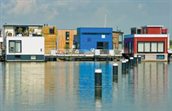Climate-proof cities focus area, Dutch National Water and Climate Knowledge and Innovation Programme (NKWK)
Urban environments accommodate more than half of the Dutch population, and this number is rising. Consequently, it is important for cities and their environments to be structured in a climate-proof and water-resilient manner. What are the best measures to this effect? This was the key question in the Climate-proof Cities focus area of the Dutch National Water and Climate Knowledge and Innovation Programme (NKWK-KBS). Between 2017 and 2023, a consortium of some fifteen to twenty knowledge institutes and consultancies have been conducting various studies within the framework of this focus area.
The Climate-proof Cities focus area (NKWK-KBS) was one of the fourteen focus areas being pursued under the Dutch National Water and Climate Knowledge and Innovation Programme. The Delta Programme for Spatial Adaptation coordinated this focus area, in collaboration with the Dutch Foundation for Applied Water Research STOWA and Deltares research institute. The studies were funded by the Dutch Ministry of Infrastructure and Water Management, and co-funded by a research consortium comprising some fifteen to twenty knowledge institutes and consultancies.
What type of knowledge is being developed?
NKWK studies can pertain to, e.g., drought and heat in urban areas, urban water quality, the potential contribution of cultural history to climate adaptation, and methods to monitor local climate resilience. On the left-hand side of this page is a link to an outline of the knowledge developed (in Dutch) and links to the NKWK studies that have been conducted between 2017 and 2023.
What type of knowledge is required?
The Climate Adaptation Knowledge Agenda maps out the climate adaptation knowledge and tools available in the Netherlands, where such knowledge can be found, and what knowledge still needs to be developed. The Knowledge Agenda comprises three documents that need to be utilised in concert. The documents are listed on the Expediting Actions page of the LIFE IP Climate Adaptation programme.
How is knowledge being shared?
The knowledge developed within the Climate-proof Cities focus area is being shared in various ways: via this knowledge portal, obviously, but also through, e.g., regional knowledge meetings, a project tour, knowledge papers, and the Freshwater and Spatial Adaptation Knowledge Day. More details are provided in the paragraphs below.
Sharing knowledge at the regional level
In 2023, NKWK-KBS organised several regional meetings for climate adaptation professionals, in collaboration with the Climate-proof Together platform, the Dutch Foundation for Applied Water Research STOWA, and the RIONED Foundation, the interest group for urban drainage concerns. The meetings – entitled “Regional knowledge x Climate-proof Cities” – were intended to enable participants to share experience regarding the tools and products developed under the NKWK-KBS programme. Several of these knowledge products were explained during the meetings in a Knowledge Review (in Dutch). Accounts of the meetings have been compiled in the report Looking back on an interactive year (in Dutch).
NKWK-KBS project tour
The National Water and Climate Knowledge and Innovation Programme has been organising the NKWK-KBS project tour within the framework of the Climate-proof Cities focus area. This tour covers a range of climate adaptation projects in the Netherlands. It enables practitioners and parties providing expertise to exchange know-how and practical experience. The NKWK-KBS project tour has already called on the following eleven locations: the Twentse Stedenband, Culemborg, Nijmegen, Dordrecht, Alkmaar, Amersfoort, Renkum, Wolvega, Zoeterwoude-Rijndijk, Kampen, and Groningen. The project visits are always attended by 75 to more than 100 participants and generally pass in an enthusiastic atmosphere.
Knowledge Papers
Over recent years, NKWK-KBS has published four knowledge papers: Natte Krant (Wet Newspaper), Droge Kost (Dry Stuff), Heet Nieuws (Hot News), and Hoog Water (High Water) (all in Dutch). The first knowledge paper is a special issue on waterlogging, the second one is focused on drought, the third one on heat, and the fourth one on urban flooding.
Freshwater and Spatial Adaptation Knowledge Day
Since December 2020, the Freshwater Delta Programme and the Delta Programme for Spatial Adaptation have been collectively organising bi-annual knowledge days. The Freshwater and Spatial Adaptation knowledge days enable researchers to discuss questions and potential knowledge requirements. They also provide room for mutual updates on research and innovations in the fields of freshwater supply and climate adaptation. View the reports on the previous years below (in Dutch):
What practical lessons are being learned?
This focus area also involves many pilot studies and testing grounds to conduct practical research, e.g., by way of experiments and by field-testing tools that have been developed. Between 2019 and 2021, eight pilot studies have been conducted involving experiments with financial incentives (in Dutch). In the city of Eindhoven, a testing ground has been set up to field-test and further develop the “Climate Bank” (in Dutch). The Climate Bank is an instrument that can be used in urban developments to ensure the proper incorporation of adaptation measures in construction projects. Furthermore, the Climate Bank enables users to determine the locations at which measures will be most effective or where land prices are low.
